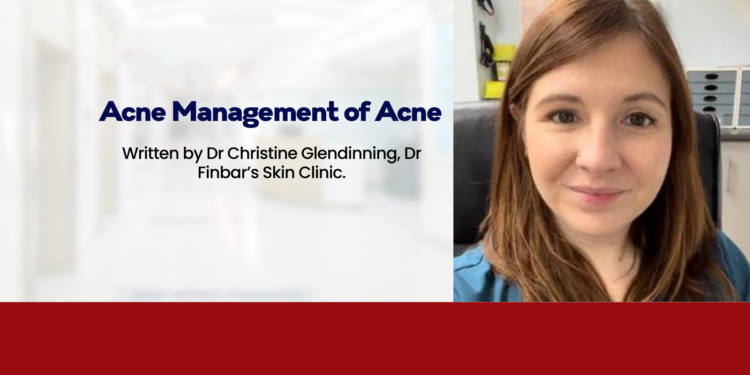Dr Glendinning is a GP specialising in dermatology. She works in Dr Finbar’s Skin Clinic, just over the border in Loughbrickland, County Down.

Written by Dr Christine Glendinning, Dr Finbar’s Skin Clinic.
Facebook: @DrChristineSkinGP

Among 16–18-year-olds, up to 85% experience some form of acne. Surprisingly though, half of women in their 20s, a third in their 30s, and a quarter in their 40s also experience acne. The disease burden, when considering the frequent impact on mental health and wellbeing, can be comparable to conditions like diabetes or asthma. At Dr Finbar’s Skin Clinic we see many patients with acne each day, from the mild to the most severe end of the spectrum.
What causes acne?
Acne is multifactorial – so there are many ways to help it. It’s true that hormonal factors – androgen production and fluctuations in the menstrual cycle – are the main contributors. But there’s a strong genetic component and as a range of lifestyle factors that are involved, including disrupted sleep, dairy intake, high sugar and high GI index foods. Medication such as anticonvulsants, steroids and the minipill can worsen it – so it’s always worth checking the patient’s drug history.
How do I assess the patient?
Acne may be confined to the face but may also involve the back, chest and neck. In its mildest form it’s comedonal – blackheads and bumpy whiteheads. Moderate acne tends to look red and inflamed, and you’ll see some papules –raised red bumps – and pustules, which are the classic ‘pimple’. Severe acne has even larger lumps – nodules and cysts. Scarring can occur at any stage and is particularly important to look out for, as we’ll see below.
Helping patients with acne –over-the-counter treatments
In mild cases, benzoyl peroxide gel is a great place to start, especially
for teenagers who are just starting to get acne. It’s quite irritant though, so better to dab on to individual spots. The wash version can cover larger areas and tends to be less harsh on skin, as it stays on for a shorter time.
Azelaic acid, often prescribed as a gel or found in over-the-counter skin serums and suspensions, is less irritant than benzoyl peroxide and useful for patients who describe their skin as sensitive.
Topical retinoids such as adapalene are a popular prescribed option as they’re among the most effective topical treatments. But it’s good to know that they’re available in lower concentrations in numerous commercial creams, in the form of retinol.
Some of your products will contain salicylic acid which is anti-comedonal and removes dead skin cells. Niacinamide is anti-inflammatory, and specifically improves the redness that lingers after a spot settles.
Skin care regimes – what to recommend?
So I recommend Cleanse, Active agent, Moisturise, Sunscreen, or ‘CAMS’, to make an acronym!
A non-oil-based cleanser –particularly one that’s labelled as non-comedogenic – used twice a day.
If they have a prescription topical product or OTC gel or serum, apply that ‘active’ preparation next, followed by
a water-based moisturiser
And (in the morning only) finish with a sunscreen of at least SPF 30 and a 5-star UVA rating. The sunscreen’s important as acne treatment can increase sun sensitivity, but just as much for keeping the skin healthy in later life.
Who to refer for a medical assessment?
A major priority of acne treatment is to prevent scarring, so if the patient has already developed some scars, or if you’re seeing large nodules, pustules or cysts, I’d recommend directing the patient to their GP or dermatologist as soon as possible, as it’s likely they’ll need systemic treatment as well as topical. This will usually entail oral antibiotics, and some will need Roaccutane, which is extremely effective but has numerous side-effects including mood changes. Female patients will need effective contraception. Similarly, if the acne isn’t as severe but it’s covering the chest or back, topical treatments will be impractical – these patients usually go straight to oral antibiotics or the combined pill.
5 top tips for acne
1. Discourage picking!
Picking at acne exacerbates inflammation and lead to scarring. Benzoyl peroxide’s effective for drying out particularly troublesome spots. Pimple patches are also a really helpful way to cover pustules and stop picking.
2. Encourage patience
Emphasise that acne treatments take time to show results. It may
take 6-8 weeks for noticeable improvement, and their skin might worsen initially. Avoid frequently changing products!
3. Moisturising is important
Moisturising is essential for acne sufferers, including those with oily skin. It helps prevent overdrying, which can increase irritation and trigger more acne. Recommend fragrance-free, water-based moisturisers and caution against facial oils and oil-based products.
4. Offer non-soap cleansers
Foaming cleansers that contain soap can strip the skin’s natural oils, causing dryness and irritation. Recommend non-soap-based cleansers that are gentler on skin.
It’s always worth asking patients how their acne’s affecting their day-to-day life – you’ll be amazed how much even a small change, using some of the tips above, can make a difference to confidence and happiness.
Ironically, there are so many skin cleaners and exfoliants available nowadays that many patients are over-exfoliating and over scrubbing their skin, which actually increases inflammation and makes acne worse.
5. Caution against overexfoliation
Over-exfoliating can worsen acne by irritating the skin. Advise against daily scrubs, pore strips, or harsh face masks. Recommend gentle exfoliation once a week at most.









